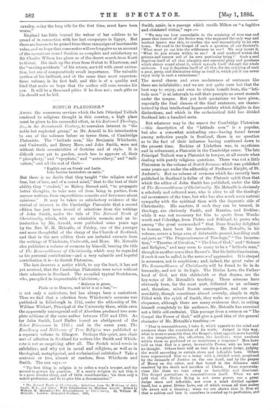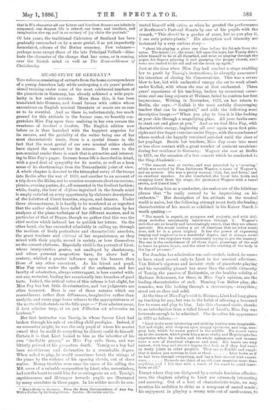SCOTCH PLATONISM.*
AMONG the numerous services which the late Principal Tulloch rendered to religious thought in this country, a high place must be given to his successful effort, in his Rational Theology, 4-c., in the Seventeenth Century, to reawaken interest in " the
noble but neglected group," as Mr. Arnold in his introduction to one of the volumes before us terms them, of Cambridge Platonists. The " latitude men," like Benjamin Whichcote, and Cudworth, and Henry More, and John Smith, were not without their eccentricities of doctrine and of style. It is difficult even yet to pardon, much less to approve of, their " plerophory," and " epoptiets," and " autaaathesy," and " radi- cation," and all the rest of their-
" English cut on Greek and Latin, Like fustian heretofore on satin."
But there is no doubt that they taught "the religion not of fear, but of love, and of a sound mind," that to the best of their ability they " studied," as Bishop Burnet said, "to propagate better thoughts, to take men off from being in parties, from narrow notions, from superstitious conceits and fierceness about opinions." It may be taken as satisfactory evidence of the
revival of interest in the Cambridge Platonists that a second edition has just been issued of selections from the writings of John Smith, under the title of The Natural Truth of Christianity, which, with an admirable memoir, and an in- troduction by Mr. Arnold, were published some years ago by the Rev. W. M. Metcalfe, of Paisley, one of the younger and more thoughtful of the clergy of the Church of Scotland, and that in the new edition there are included extracts from the writings of Whichcote, Cudworth, and More. Mr. Metcalfe
also publishes a volume of sermons by himself, bearing the title
of The Reasonableness of Christianity, which may be regarded as his personal contribution—and a very valuable and hopeful
contribution it is—to Scotch Platonism.
The fact deserves a notice which, to say the least, it has not yet received, that the Cambridge Platonists were never without their admirers in Scotland. The so-called typical Scotchman,
who, panoplied in impenetrable Calvinism,— "Believes in gross, Plods on to Heaven, and ne'er is at a loss,"— is not only a caricature, but has always been a caricature. Thus we find that a selection from Whicbcote's sermons was published in Edinburgh in 1742, under the editorship of Dr. William Wishart, Principal of the University there, while even
the apparently uncongenial soil of Aberdeen produced two com- plete editions of the same author between 1750 and 1780. As for John Smith, Lord Holies issued an abridgment of the
Select Discourses in 1745 ; and in the same year, The Excellency and Nobleness of True Religion was published as a separate volume in Glasgow. Perhaps this quiet, arm-chair sort of affection in Scotland for writers like Smith and Which-
cote is not so surprising after all. The Scotch mind revels in
subtleties ; and why not in moral and religions, as well as in theological, metaphysical, and ecclesiastical subtleties P Take a sentence or two, almost at random, from Whichcote and Smith. The one says :— " The first thing in religion is to refine a man's temper, and the second to govern his practice. If a man's religion do not this, it is a poor, slender thing, and of little consideration ; 'tie then only a naked profession, and fit to give him a denomination."
• The Natural Truth of Cheittianity ; Selections from the Writings of John Smith, M.A., and others. With Introduction by Matthew Arnold. Edited by William M. Metcalfe.—The Reasonableness of Chrie'innity. By William M. Metcalfe. London: Alexander Ebrdner. 1886. Smith, again, in a passage which recalls Milton on " a fugitive and cloistered virtue," says :— " We may see how unavailable to the attaining of true rest and peace that conceit of the Stoics was, who supposed the only way and method hereto was this, to confine the soul monastically to its own home. We read in the Gospel of each a question of our Saviour's,
What went ye out into the wilderness to see ? We may invert it,
What do you return within to see ? A soul confined within the private and narrow cell of its own particular being F' Sach a soul deprives itself of all that almighty and essential glory and goodness which shines round about it, which spreads itself through the whole universe. I say it deprives itself of all this, for the enjoying of such a poor, petty, and diminutive thing as itself is, which yet it can never enjoy truly in such a retiredness."
The moral charm and even modernness of sentences like these are indubitable; and we are not quite sure but that the best way to enjoy, and even to obtain benefit from, the "lati- tude men " is at intervals to roll their precepts as sweet morsels under the tongue. But yet both quotations we have given, especially the final clauses of the final sentences, are charac- terised by that intellectual hyper-subtlety which delights in fine distinctions, and which in the ecclesiastical field has divided Scotland into a hundred sects.
But whatever may be the reason for Cambridge Platonism —this description of the " latitude men " is a popular, but also a somewhat misleading one—having found favour among reflective people in Scotland, there is no question as to the fact of their influence having continued down to the present time. Erskine of Linlathen was, in mysticism and in refinement, a Platonist in the Cambridge sense. The late Principal Tulloch was a Platonist in temper, at all events when
dealing with purely religious questions. There was not a little Platonism in the volume of Scotch Sermons which was published some years ago under the editorship of Professor Knight, of St. Andrew's. But no volume of sermons which has recently been
published in Scotland is fuller of the Platonic spirit than that which the editor of John Smith has published, under the title
of The Reasonableness of Christianity. Mr. Metcalfe is obviously a scholarly and cultured man, who is alive to all the theologi-
cal movements of the time, but who has also much more natural sympathy with the spiritual than with the dogmatic side of Christianity. His masters, if such they can be termed, in theology, are obviously Smith, and Maurice, and Erskine; while it was not necessary for him to quote from Words- worth and Coleridge, from Fichte and Schlegel, to prove who among "the great uncassocked " that Dean Stanley delighted to honour, have been his favourites. Mr. Metcalfe, in his volume, covers a large area of debateable ground, handling such subjects as "The Progressiveness of Theology," "The Incarna- tion," " Theories of Creation," " The Idea of God," and" Science and Religion," and may seem to many to be a " latitude man," though in another sense than Burnet's. But his latitudinarianism,
if such it can be called, is the reverse of aggressive. It is steeped in reverence, not in scepticism ; and, indeed, the great value of The Reasonableness of Christianity will bo found to lie in its
humanity, and not in its logic. The Divine Love, the Father- hood of God, not this shibboleth or that dogma, are the key-notes of Mr. Metcalfe's teaching. These sermons have obviously been, for the most part, delivered to an ordinary and, therefore, mixed Scotch congregation, and are com- mendably, though sometimes almost severely, simple in style. Filled with the spirit of Smith, they make no pretence at his eloquence, although there are many evidences that, in suiting himself completely to his audience, Mr. Metcalfe has exercised
not a little self-restraint. This passage from a sermon on " The Gospel the Power of God," will give a good idea of the general
character of Mr. Metcalfe's teaching :—
" That is reasonableness, I take it, which appeals to the mind and awakens there the conviction of its troth. Judged in this way, what is more reasonable than the Gospel ; what appeals more forcibly to the imagination, the affections, the intellect; what awakens within them so profound or so unanimous a response? Men have told ns that God is a great, inscrutable Power, with no love and no thought. Others have told us that He is a great Judge, judging the world according to certain stern and inflexible laws. Others have represented Him as a being with a divided mind, perplexed by the demands of Justice on the one hand, and by the prayer of Mercy on the other, and fast bound in the dilemma until resolved by the death and sacrifice of Christ. From representa- tions like these we turn away as incredible and irrational. The Gospel portraiture is reasonableness itself. When we are told that the Divine Being is not mere power, nor a great Judge stern and inflexible, nor even a mind divided against itself, but a great Divine Love, out of which comes all that makes life sweet and a blessing; when we are shown that in Him all that is noblest and best in ourselves is carried up to perfection, and
that in His character all our fairest and loveliest dreams are infinitely surpassed, our deepest life is stirred, our heart, and intellect, and imagination rise up, and in an ecstasy of joy claim the portrait."
Of late years, the traditional Calvinism of Scotland has been gradually encroached on by a more genial, if as yet imperfectly formulated, scheme of the Divine economy. Few volumes— perhaps none except those of the late Principal Tulloch—illus- trate the character of the change that has come, or is coming, over the Scotch mind so well as The Reasonableness of Christianity.





































 Previous page
Previous page